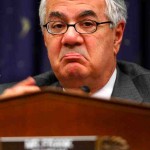Will Voters Punish Frank for Mortgage Meltdown?
 Barney Frank, who usually coasts to victory, is in one of the toughest reelection fights of his career. Can he survive voter anger over his role in the mortgage mess?
Barney Frank, who usually coasts to victory, is in one of the toughest reelection fights of his career. Can he survive voter anger over his role in the mortgage mess?
In the aftermath of the financial crash and in the midst of 9.6 percent unemployment, it is only fitting that Massachusetts Congressman Barney Frank, the Chair of the House Financial Services Committee and the best friend that the Federal National Mortgage Association (Fannie Mae) and the Federal Home Loan Mortgage Corporation (Freddie Mac) could have ever dreamed of, is in the fight of his political life against Sean Bielat, a Major in the United States Marine Corps Reserves. In his last two mid-term elections, Frank garnered at least 98 percent of the vote. Now, the latest polls have Frank at under 50 percent, sweating, campaigning hard and knowing that his future is uncertain.
Frank’s plight is emblematic of the Democratic Party’s woes. Frank’s defense of, and his relationship with Fannie Mae and Freddie Mac, the two largest players in the mortgage lending industry, are what is wrong with Washington and what is offensive about crony capitalism. Frank’s Fannie and Freddie Fiascos crystallize the fact that the judgment and moral compass of the Northeast Democratic liberal elite are no more acute or fine-tuned than those of the rest of the country.
Fannie Mae and Freddie Mac are hybrid creatures, or “government sponsored enterprises”. They were created by Congress, but issued shares of publicly trade stock to the public. These days, Fannie and Freddie are wards of the state. In September 2008, Fannie and Freddie were placed into a conservatorship under the auspices of the Federal Housing Finance Agency. It did not have to be that way.
Back in September 2003, then-Treasury Secretary John Snow called for a new agency to be created within the Treasury Department to oversee Fannie Mae and Freddie Mac. Under Snow’s proposal, the new agency would have the authority, to partially set capital-reserve requirements for Fannie and Freddie. The proposed agency would have also exercised authority over new lines of business embraced by Fannie and Freddie, and decide whether Fannie and Freddie were properly managing their risks.
Barney Frank was having none of this. Frank attacked the proposal from the get-go. Immediately, Frank gave a thumbs-down to Secretary Snow. According to Frank, “these two entities -- Fannie Mae and Freddie Mac -- are not facing any kind of financial crisis.” Frank also gave his take on the housing market, “The more people exaggerate these problems, the more pressure there is on these companies, the less we will see in terms of affordable housing.” In other words, for all of his bluster and self-importance, Frank did not see the writing on the wall.
This is not the end of the story. As a congressman, Frank received over $40,000 in campaign contributions from Fannie Mae. Further, Frank’s former significant other was also an executive of Fannie Mae. Frank’s ethical and judgmental contortion puts the lie to the claim that “it’s just business.”
Sorry Barney. It is about raiding the public fisc for personal gain; it is about the haves skimming from the rest of us; and it is about those whose moral indignation is little more than self-interest wrapped in the cheap gauze of claiming to do the public-weal.
Unfortunately, Frank’s story is not an isolated event. Fannie Mae’s ties go deep to this administration. Barrack Obama’s tapped Jim Johnson to serve as the chief of his veep search, despite Johnson having served as chairman and chief executive officer of Fannie Mae, and despite the fact that a 2006 oversight report found that Fannie Mae had substantially under-reported Johnson’s compensation. Johnson actually received approximately $21 million, not the $6- 7 million that been previously been reported. Ultimately, Johnson was forced to step down from the Obama campaign.
But it does not end there. Franklin Raines, another former Fannie Mae head, took early retirement from Fannie Mae after it was disclosed that his compensation had been wrongly boosted by a series of accounting errors. Raines ultimately paid out millions in fines to settle the government's charges. This did not stop Barack Obama from consulting with Raines during the course of the campaign.
The latest Fannie Mae alumnus to grace Obama’s circle is Tom Donilon. Donilon was recently appointed as the new National Security Advisor. Interestingly, Donilon is a former Fannie Mae lobbiest par excellence. According to The Nation, “Fannie Mae paid Donilon, a longtime Democratic Party operative, $15 million to lobby Congress to gut the power of government regulators . . . .” Donilon “was also a top executive at Fannie Mae during the period when cooking the books to increase executive compensation would later lead to a $400 million fine.”
Unfortunately, we are still paying for Fannie and Freddie’s sins. Over the next three years the cost of bailing out Fannie Mae cut hit $363 billion. Up until now, tax payers have spent $148 billion to shore up Fannie and Freddie.
Which brings me back to Barney Frank. Back in March 2009, the Economist compared the plight of beleaguered and now retiring Connecticut Senator Chris Dodd to where Frank appeared to stand. According to the Economist, Frank was “having a very good crisis.” Perhaps, then. Not anymore.